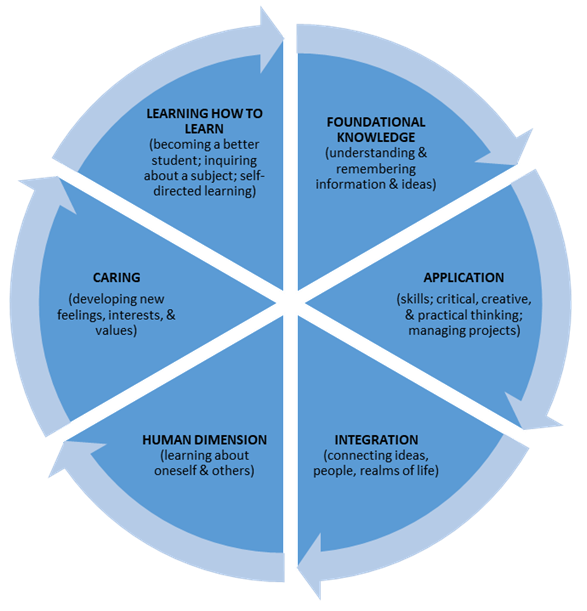Some faculty and academic programs prefer to use Fink’s Taxonomy of Significant Learning when developing their learning objective because it includes more than cognitive learning and eliminates the hierarchical structure seen in other taxonomies.
 While Foundational Knowledge and Application align with the cognitive learning seen with Bloom’s taxonomy, the other categories of learning go beyond cognition to address specific skills that enable significant learning. Unlike other taxonomies, Fink’s categories can overlap and help to develop skills in another category.
While Foundational Knowledge and Application align with the cognitive learning seen with Bloom’s taxonomy, the other categories of learning go beyond cognition to address specific skills that enable significant learning. Unlike other taxonomies, Fink’s categories can overlap and help to develop skills in another category.
Questions to Consider When developing learning objectives using Fink’s taxonomy, consider the impact you want to have on student development. The following table can serve as a guide to thinking about learning objectives using Fink’s.
| Category | Questions to ask |
|---|---|
| Foundational knowledge | What key information (facts, terms, formula, concepts, relationships) is important for students to understand and remember in the future? |
| Application | What kinds of thinking are important for students to learn: *Critical thinking, in which students analyze and evaluate? *Creative thinking, in which students imagine and create? *Practical thinking, in which students solve problems and make decisions? What important skills do students need to learn? What complex projects do students need to learn how to manage? |
| Integration | What connections (similarities and interactions) should students recognize and make *Among ideas within the program? *Among the information, ideas, and perspectives in the program? *Between material in the program and students’ own personal, social, work lives? |
| Human dimension | What can or should students learn about themselves? What can or should students learn about interacting with people that they may encounter in the future? |
| Caring | What changes would you like to see in what students care about? What changes in their interests, values, or feelings would you like to see? |
| Learning how to learn | What should students know about learning? What should students know about being a good student? What should students know about how to engage in inquiry and construct knowledge? What should students know about how to become self-directed learners? What should students know about having a learning agenda of what else they need or want to learn and creating a plan for learning it? |
| Category | Foundational knowledge | Application | Integration | Human dimension | Caring | Learning how to learn |
|---|---|---|---|---|---|---|
| Verbs for learning objectives | · Remember · Recall · Identify · Explain · Predict · Describe · Define · Summarize · Recognize · Arrange · Indicate · Classify · Associate ·Compare ·Contrast ·Paragraph ·Recite ·Restate | · Critique · Manage · Solve · Assess · Judge · Do [skill] · Imagine · Analyze · Calculate · Coordinate · Communicate ·Demonstrate ·Draw ·Employ ·Estimate ·Illustrate ·Perform | · Connect · Identify the interaction between · Relate · Compare · Contrast · Integrate · Identify the similarities between · Determine the cause ·Associate ·Blend ·Combine ·Correlate ·Differentiate ·Synthesize | ·Acquire ·Advise ·Help ·Mediate ·Nurture ·Promote ·Protect ·Resolve ·Reflect ·Respect ·Interact with others · Compare viewpoint · Discuss (world events) · Identify the impact · Plan (a change) · Determine (why actions occurred) · Advocate · Collaborate · Support · Resolve · Share | ·Renew Revitalize · Get excited about · Prepare to · Increase interest · Value · Reflect · Change · Adjust (beliefs) · Commit · Develop (a plan) · Explore · Express · Pledge | ·Critique ·Take responsibility ·Self-regulate ·Set goals · Develop (a plan) · Identify resources · Construct knowledge about · Frame useful questions · Analyze · Inquire · Reflect · Research · Self-assess · Self-monitor |
Another non-hierarchical taxonomy: Medicine wheel